考研英语阅读态度题选项归纳
考研英语阅读理解部分试题解析
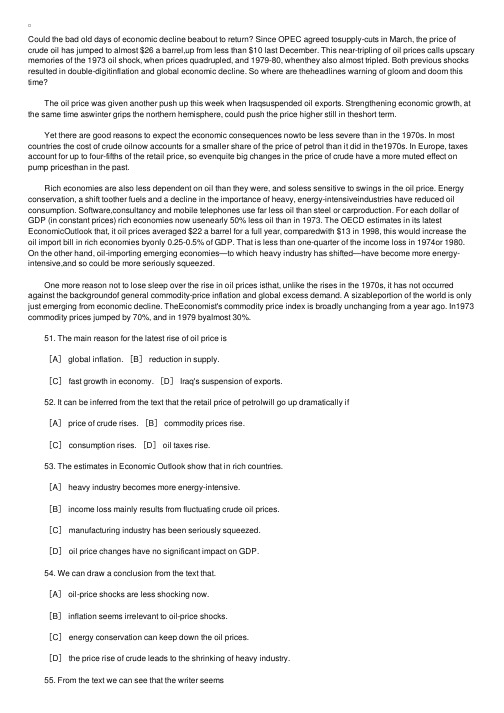
Could the bad old days of economic decline beabout to return? Since OPEC agreed tosupply-cuts in March, the price of crude oil has jumped to almost $26 a barrel,up from less than $10 last December. This near-tripling of oil prices calls upscary memories of the 1973 oil shock, when prices quadrupled, and 1979-80, whenthey also almost tripled. Both previous shocks resulted in double-digitinflation and global economic decline. So where are theheadlines warning of gloom and doom this time? The oil price was given another push up this week when Iraqsuspended oil exports. Strengthening economic growth, at the same time aswinter grips the northern hemisphere, could push the price higher still in theshort term. Yet there are good reasons to expect the economic consequences nowto be less severe than in the 1970s. In most countries the cost of crude oilnow accounts for a smaller share of the price of petrol than it did in the1970s. In Europe, taxes account for up to four-fifths of the retail price, so evenquite big changes in the price of crude have a more muted effect on pump pricesthan in the past. Rich economies are also less dependent on oil than they were, and soless sensitive to swings in the oil price. Energy conservation, a shift toother fuels and a decline in the importance of heavy, energy-intensiveindustries have reduced oil consumption. Software,consultancy and mobile telephones use far less oil than steel or carproduction. For each dollar of GDP (in constant prices) rich economies now usenearly 50% less oil than in 1973. The OECD estimates in its latest EconomicOutlook that, it oil prices averaged $22 a barrel for a full year, comparedwith $13 in 1998, this would increase the oil import bill in rich economies byonly 0.25-0.5% of GDP. That is less than one-quarter of the income loss in 1974or 1980. On the other hand, oil-importing emerging economies—to which heavy industry has shifted—have become more energy-intensive,and so could be more seriously squeezed. One more reason not to lose sleep over the rise in oil prices isthat, unlike the rises in the 1970s, it has not occurred against the backgroundof general commodity-price inflation and global excess demand. A sizableportion of the world is only just emerging from economic decline. TheEconomist's commodity price index is broadly unchanging from a year ago. In1973 commodity prices jumped by 70%, and in 1979 byalmost 30%. 51. The main reason for the latest rise of oil price is [A] global inflation. [B] reduction in supply. [C] fast growth in economy. [D] Iraq's suspension of exports. 52. It can be inferred from the text that the retail price of petrolwill go up dramatically if [A] price of crude rises. [B] commodity prices rise. [C] consumption rises. [D] oil taxes rise. 53. The estimates in Economic Outlook show that in rich countries. [A] heavy industry becomes more energy-intensive. [B] income loss mainly results from fluctuating crude oil prices. [C] manufacturing industry has been seriously squeezed. [D] oil price changes have no significant impact on GDP. 54. We can draw a conclusion from the text that. [A] oil-price shocks are less shocking now. [B] inflation seems irrelevant to oil-price shocks. [C] energy conservation can keep down the oil prices. [D] the price rise of crude leads to the shrinking of heavy industry. 55. From the text we can see that the writer seems [A] optimistic. [B] sensitive. [C] gloomy. [D] scared. ⼀、⽂章结构分析 ⽂章⼤意:最近这次⽯油价格的⼤幅上涨的影响不会像以前那样严重。
考研英语四六级阅读理解作者态度观点信号词寻找以及常见态度词汇集锦附小测试一题

常见观点态度词语小测试:positive favorable(dis)approvalsupportive defensive negativeobjection critical oppositionobjective subjective optimisticindifferent compromising uninterestedquestioning disappointed concernedneutral cautious pessimisticbiased suspicious doubtful态度观点信号词:论点:认为,相信:argue , argument , believe , suppose, think , be convinced that [相信] , hold the belief that … , have a notion that …, view…as , regard….as , see…as, consider….to be, reckon [算作,设想],论据: for example , for instance , specifically, take… as an examplelike , such as … , Imagine …. ,调查研究:investigation , inquiry [hold an inquiry into a case对一个案子进行调查]research, study, survey, report , questionnaire[调查问卷],measurement ,调查研究结果:得出结论:conclude th at … ,come to a conclusion that …. ,draw a conclusion that …表明,发现:show , suggest , demonstrate , manifest [清楚地显示或表示]display, find , find out, discover, reveal , proveindicate, imply,预测、预报、预言:forecast , foretell, foresee, predict表示赞同:agree, appreciate意识到, 懂得, approve赞成、批准, consent to同意表示反对:against , disagree, disapprove, dissent from, object to ,be opposed to反对表示事实:belief , fact , reality, truth表示理论,设想:assumption , theory, hypothesis [假设]表示目的:to do, aim at, for the sake of , for , serve as, in favor of [有利于],for the purpose of, intend to do ,论据中常见专家名称:expert , specialist , professor , associate professor [副教授],sociologist [社会学家],economist, linguist[语言学家],consultant [顾问] psychologist [心理学家],behaviorist [行为学家],philosopher[哲学家] , anthropologist [人类学家],archaeologist [考古学家]逻辑信号词-路标词1,表示因果的原因:后接句子--- Because, since , as , for后接词组--- because of , thanks to由于,多亏, owing to 由于, 因...之缘故, due to , as a result of 作为结果,by/in virtue of [由于]* The movie touched me by virtue of its story.结果:so(that), accordingly[因此];as a result; consequently; for this(that)reason; hence; therefore此外:表因果的特色词汇比如A 是因,B是果:Greenhouse effect is responsible for weather changeA account for / be responsible for BA cause / lead to / result in / bring about / bring on / trigger /give rise to B2,表示转折的“但是,然而”:but , however; yet , nevertheless, whereas“尽管,虽然”:后接句子--- although , though, even though , while ,#notwithstanding后接词组--- despite; in spite of“相反地”:conversely[相反地] ; on the contrary;“另一方面”:on the other hand;3,表示比较的by comparison ; in contrast (相比之下); in the same way; similarly4,表示递进的also; besides; furthermore; in addition; in particular(特别地)more importantly; moreover; What’s more5,表示概括的in brief; in conclusion; in short; in a word , in sum; to sum up; on the whole , to conclude6.表示并列:and , or , at the same time, meanwhile , as well as一、态度词汇总1.积极:approving 赞许的,,optimistic 乐观的, sympathetic 同情的, consent 赞成2.消极:negative否定的,消极的,反面的,pessimistic 悲观的,apprehensive 忧虑的,reserved 有保留的,内向的,arbitrary武断的, biased有偏见的,偏心的, partial 不公平的, critical 持批评态度的, depressing 令人沮丧的,disappointing令人失望的, doubtful怀疑的,object反对, be opposed to/opposing反对的, scared惊恐的,panick恐慌, sensitive敏感的,subjective主观的, suspicious怀疑的3.中性:objective 客观的,impartial 公平的, unbiased公正的4. 情绪:anger愤怒, indignant 愤怒的r, happy高兴的, contempt轻视, gloomy沮丧的5.其它:surprized惊奇的, amazed惊奇的, puzzled迷惑的, ambiguous模棱两可的, neutral 中立的,indifferent漠不关心的, subjective 主观的6.对态度的修饰词:reserved有保留的, cautiously谨慎地, enthusiatic热烈的, strong强烈的, radical激进的二、态度词分析1.可能的态度:考研阅读考的的态度有两种,一种是作者,另一是非作者的其它人。
考研英语阅读态度题选项归纳.doc

一.情感态度题的词语选项一般可以分为以下几种:1.褒义词impartial,(公正的), rewarding(有回报的), appreciative (欣赏的),positive (肯定的, 积极的), optimistic (乐观的), useful (有用的, 有益的), admiring (赞赏的, 钦佩的), interesting (有趣的), instructive (有益的, 教育性的), enthusiastic (热心的, 热情的), supportive (支持的), support(支持), approval (赞成, 承认), approving (满意的), confident (自信的, 确信的), impressed (留下印象的), reverent (尊敬的), polite (有礼貌的, 文雅的)。
2.贬义词Apprehensive(担忧的), hostile (敌对的), dubious(怀疑的),intolerant (不能容忍的), negative (否定的, 消极的), pessimistic (悲观的, 厌世的), subjective (主观的, 个人的), disappointed (失望的), frustrated (失败的, 落空的), critical (批评的), questioning (质疑的), doubtful (可疑的, 不确的), compromising (妥协的), dissatisfied (不满意的, 不高兴的), biased (有偏见的), satirical (讽刺的), puzzling (迷惑的), suspicious (怀疑的), gloomy (令人沮丧的), scared (恐惧的), cynical (愤世嫉俗的), oppose (反对), opposition (反对), disgust (令人反感), disgusting (令人厌恶的), worried (闷闷不乐的), depressed (沮丧的), contemptuous (轻蔑的, 侮辱的), arbitrary/opinionated (武断的) 。
考研英语历年阅读理解真题精析--2006年part2
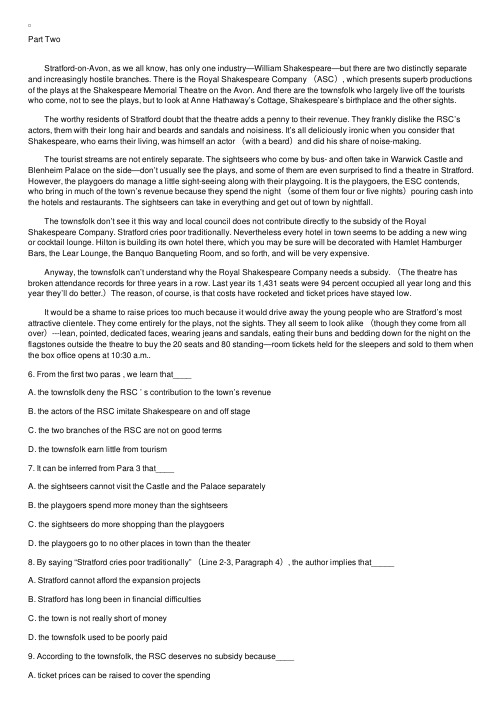
Part Two Stratford-on-Avon, as we all know, has only one industry—William Shakespeare—but there are two distinctly separate and increasingly hostile branches. There is the Royal Shakespeare Company (ASC), which presents superb productions of the plays at the Shakespeare Memorial Theatre on the Avon. And there are the townsfolk who largely live off the tourists who come, not to see the plays, but to look at Anne Hathaway’s Cottage, Shakespeare’s birthplace and the other sights. The worthy residents of Stratford doubt that the theatre adds a penny to their revenue. They frankly dislike the RSC’s actors, them with their long hair and beards and sandals and noisiness. It’s all deliciously ironic when you consider that Shakespeare, who earns their living, was himself an actor (with a beard)and did his share of noise-making. The tourist streams are not entirely separate. The sightseers who come by bus- and often take in Warwick Castle and Blenheim Palace on the side—don’t usually see the plays, and some of them are even surprised to find a theatre in Stratford. However, the playgoers do manage a little sight-seeing along with their playgoing. It is the playgoers, the ESC contends, who bring in much of the town’s revenue because they spend the night (some of them four or five nights)pouring cash into the hotels and restaurants. The sightseers can take in everything and get out of town by nightfall. The townsfolk don’t see it this way and local council does not contribute directly to the subsidy of the Royal Shakespeare Company. Stratford cries poor traditionally. Nevertheless every hotel in town seems to be adding a new wing or cocktail lounge. Hilton is building its own hotel there, which you may be sure will be decorated with Hamlet Hamburger Bars, the Lear Lounge, the Banquo Banqueting Room, and so forth, and will be very expensive. Anyway, the townsfolk can’t understand why the Royal Shakespeare Company needs a subsidy. (The theatre has broken attendance records for three years in a row. Last year its 1,431 seats were 94 percent occupied all year long and this year they’ll do better.)The reason, of course, is that costs have rocketed and ticket prices have stayed low. It would be a shame to raise prices too much because it would drive away the young people who are Stratford’s most attractive clientele. They come entirely for the plays, not the sights. They all seem to look alike (though they come from all over)---lean, pointed, dedicated faces, wearing jeans and sandals, eating their buns and bedding down for the night on the flagstones outside the theatre to buy the 20 seats and 80 standing—room tickets held for the sleepers and sold to them when the box office opens at 10:30 a.m..6. From the first two paras , we learn that____A. the townsfolk deny the RSC ’ s contribution to the town’s revenueB. the actors of the RSC imitate Shakespeare on and off stageC. the two branches of the RSC are not on good termsD. the townsfolk earn little from tourism7. It can be inferred from Para 3 that____A. the sightseers cannot visit the Castle and the Palace separatelyB. the playgoers spend more money than the sightseersC. the sightseers do more shopping than the playgoersD. the playgoers go to no other places in town than the theater8. By saying “Stratford cries poor traditionally” (Line 2-3, Paragraph 4), the author implies that_____A. Stratford cannot afford the expansion projectsB. Stratford has long been in financial difficultiesC. the town is not really short of moneyD. the townsfolk used to be poorly paid9. According to the townsfolk, the RSC deserves no subsidy because____A. ticket prices can be raised to cover the spendingB. the company is financially ill-managedC. the behavior of the actors is not socially acceptableD. the theatre attendance is on the rise10. From the text we can conclude that the author_____A. is supportive of both sidesB. favors the townsfolk’s viewC. takes a detached attitudeD. is sympatheticUnit 13(2006) Part 2重点词汇:1. hostile a. 含敌意的,极不友好的2. superb a. 极好的,的;华丽的,⾼贵的;⾮常的,极度的3. revenue n. 收⼊,岁⼊4. subsidy n. (政府、慈善机构等分发的)补助⾦;津贴,补贴;捐款,资助;拨款;(国家之间的)财政援助5. attendance n. 出席,到场;(总称)出席者,听众,观众;照料,护理,伺候6. decorate v. 装饰,打扮7. rocket v. 上升,迅速增加8. attractive a. 有吸引⼒的,诱⼈的9. sandal n. 凉鞋10. sightseer n. 观光者,旅游者11. flagstone n. ⽯板12. playgoer n. 戏迷13. standing-room n. (剧场、体育场等的)站席空位;站⽴空间14. 重要词组live off 住在……以外;靠……⽣活;靠……供养;以……为主⾷on the side 秘密地,暗地⾥;作为兼职;作为副业on the safe side 可靠的;安全的along with 与……⼀起;共同;连同;随着;加之15. bring in 引进;引⼊;⽣产;产出;收益;进款;挣得(钱);提出(议案);拘捕;逮捕;让某⼈参与计划16. take in 让……进⼊;接纳;接受;接待;收留;把……领⼊;包括;涉及;参观;游览;观看(戏剧、电影等)缩短;改⼩⾐服;收缩;兼并;获得(⼟地);订阅(报刊、杂志等);收⼊;进账;开始;注意到;敏锐地观察到;马上看到;看出;⼀⽬了然;领会;理解17. get out of 从……出来;从……取出来;从……解脱/离开;从……获得/得到;戒掉;使摆脱(某事/某习惯);使避免;(使某⼈)逃避(责任、义务、职责等)18. stay low 保持低速;保持低价位19. drive away sb. 开车送⾛(某⼈);驱散(某⼈);赶⾛(某⼈)20. drive away at 拼命⼲,努⼒做⼯作;孜孜不倦地⼲21. game n. 游戏,运动;娱乐活动;猎物(本⽂意义),猎获物;野味试题解析:6.【正确答案】[A]the townsfolk deny the RSC’s contribution to the town’s revenue.【测试要点】这是⼀道细节判断题。
考研英语阅读常见题型归纳
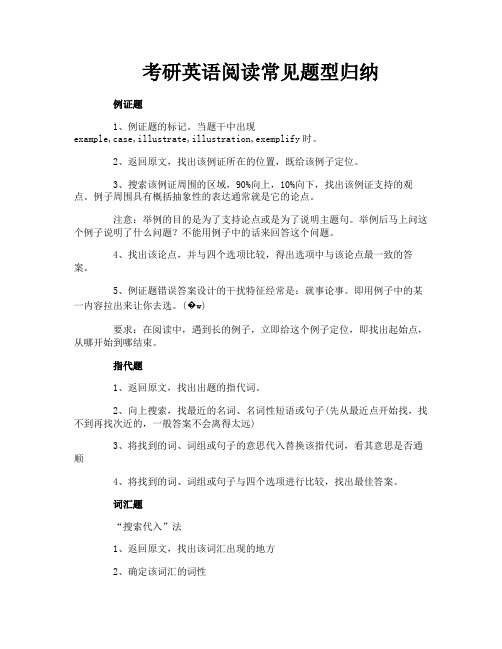
考研英语阅读常见题型归纳例证题1、例证题的标记。
当题干中出现example,case,illustrate,illustration,exemplify时。
2、返回原文,找出该例证所在的位置,既给该例子定位。
3、搜索该例证周围的区域,90%向上,10%向下,找出该例证支持的观点。
例子周围具有概括抽象性的表达通常就是它的论点。
注意:举例的目的是为了支持论点或是为了说明主题句。
举例后马上问这个例子说明了什么问题?不能用例子中的话来回答这个问题。
4、找出该论点,并与四个选项比较,得出选项中与该论点最一致的答案。
5、例证题错误答案设计的干扰特征经常是:就事论事。
即用例子中的某一内容拉出来让你去选。
(�w)要求:在阅读中,遇到长的例子,立即给这个例子定位,即找出起始点,从哪开始到哪结束。
指代题1、返回原文,找出出题的指代词。
2、向上搜索,找最近的名词、名词性短语或句子(先从最近点开始找,找不到再找次近的,一般答案不会离得太远)3、将找到的词、词组或句子的意思代入替换该指代词,看其意思是否通顺4、将找到的词、词组或句子与四个选项进行比较,找出最佳答案。
词汇题“搜索代入”法1、返回原文,找出该词汇出现的地方2、确定该词汇的词性3、从上下文(词汇的前后几句)中找到与所给词汇具有相同词性的词(如一下子找不到就再往上往下找),代入所给词汇在文章中的位置(将之替换)看语义是否合适4、找出选项中与代替词意思相同或相近的选相,即答案注意:a.如果该词汇是简单词汇,则其字面意思必然不是正确答案b.考研阅读不是考察字认识不认识,而是考察是否能根据上下文作出正确的判断。
c.词汇题的正确答案经常蕴藏在原文该词汇出现的附近。
注意不能靠单词词义直接往下推。
d.寻找时要注意同位语、特殊标点(比如分号,分号前后两句话的逻辑关系不是形式上的并列就是语义上的并列,也就是两句话的意思相同,所以可用其中一句话的意思来推测另一句话的意思从而推出所给词汇含义)、定语从句、前后缀,特别要注意寻找时的同性原则。
考研英语阅读理解文章态度题解析

2021考研英语阅读理解文章态度题解析在备考中,遇到文章态度题我们应该如何解析呢?下面由为你精心准备了“2021考研英语阅读理解文章态度题解析”,持续关注将可以持续获取更多的考试资讯!
问文中某人对某事物的态度。
作为作者态度题的一种新形式,命题也开始注重考查文章中某人对某事的观点和态度。
题干中常有attitude,opinion,tone等。
选项可能不再是态度明确的肯定或否认的词,而改为带有程度限制的词语。
比方guarded(慎重的),qualified(有条件的,有限制的),reserved(有保存的),tempered(温和的,缓和的)。
(1)What is the tone(mood)of “…” ?(2)What is “…” opinion about?
要注意区分作者的态度与其他人的态度。
因为持有保存态度的观点比较客观,往往是正确答案。
文章陈述的内容并非都是作者的观点,要注意区分,这是命题最具有迷惑性的地方。
因此,作者引用别人的观点时,是作为支持或抨击的对象,别人的观点通常是为了证明作者的论据来给出的。
这类试题与作者态度题不同,作者观点一般与文章主旨相关联,而文章某人的观点那么不一定紧密相关。
一般带有绝对化或过于强烈的词修饰的选项必错。
比方:strongly,pletely,entirely,enthusiasticly等。
2021考研英语阅读解题关键-文章主旨+作者态度

2021考研英语阅读解题关键:文章主旨+作者态度主旨和作者的态度是一篇文章的灵魂,把握这两条脉络对于理清整篇文章的结构以及解题至关重要,这也是读懂考研阅读的第一步。
一、文章主旨文章主旨考查的是考生对中心思想的理解,考查内容可分为对文章中心和段落中心的考查。
由考研文章本身的特点所决定,其难度不高,但解答的正确与否却相当关键,直接决定着本篇文章其他试题的解答。
因此,此类试题一般属于必得分点。
段落中心句往往位于段首或者段末,或体现段落的观点(有say,argue,must,should等标志词),或体现段落的逻辑关系(对比和递进的逻辑关系为主)。
●解题思路标志:best title main idea main problem conclusion mainly discuss mainly deal with或者问作者的写作目的purpose the author intends to do sth a digest of利用宏观阅读技巧作主旨题,不管是出现在什么位置,都把他作为最后一题来做。
方法:(1)段落少,用串线法。
串线法是在解文章中心时,使用最多,最有效的方法,此方法要求考生能够将该篇文章每个段落的中心句串在一起,总结概括之后得出文章中心。
通常情况下,正确答案中一定会涵盖文章的关键词(中心词),且正确答案具有抽象、高度概括的特点,不涵盖绝对的肯定或否定的说法。
而错误选项仅仅代表了文章的局部信息,或范围过宽。
(2)快速作文法:两个选项难以分辨的时候,用这两个选项做作文,快速给出纲。
(3)选项不能选择局部信息,也不能选范围过宽的信息。
二、作者态度对作者态度的判断是构成阅读理解的两条宏观主线之一。
因此,正确辨明作者对所叙述事物的态度,不仅关系到本类题型的解答,也潜在地影响到其他问题的正确解答。
这类题目主要是从作者文中描述事物所用到的形容词、副词和动词等表达感情色彩的词汇或语句入手,尤其是系表结构的语句。
206考研英语(一二)阅读理解态度题分析

2016考研:英语(一、二)阅读理解态度题分析考研英语阅读不管是英语(一)还是(二),每年都会有考察作者态度题。
英语(二)考察的第6个能力是理解作者的意图、观点或态度。
那下面我们就来谈谈如何解态度题。
首先,要学会识别态度题。
态度的标志是含有attitude或者是the author believes/seems/considers/regards等等。
选项的特征是opposition反对、suspicion怀疑的、pessimistic悲观的、approval支持、impartial公平的、objective客观的、sensitive敏感的、不能选的是biased有偏见的、puzzling迷惑的、subjective主观的、indifference冷漠。
第二,作者态度只分为三大类。
除了这3类没有任何其他态度。
如果4个选项中有2个或以上同类的选项,那肯定是错的。
正确的答案只有一个。
这三类是1)支持,赞同和乐观;2)客观,中立和3)反对,批评,怀疑和悲观。
漠不关心,令人迷惑的,有偏见的这些都不能做正确的选项。
第三,从文章中识别作者态度有以下方法:1)当没有明确作者态度的词或句子时,要特别敏锐的定位带有褒贬义或含有感情色彩的词,尤其是出现在中心句或文章主线当中如fortunately, excessively, too many一定要划出来。
2)要特别注意作者的例子,当没有找到作者态度的时候,注意作者为了表达态度的例子。
如果正反都出现,那就是中立的态度。
3)串线法,认真读首段和各段首尾句和转折处。
这样从整体上看谋篇。
能很好的看到作者的态度。
第四,要特别注意的是,最近几年的出题趋势。
1)开始不仅仅考察作者的态度,还开始考察文中某个人观点和态度是什么。
2)选项开始出现不再是态度明确的肯定或否定的词,而改为带有程度限制的词语。
比如reserved(有保留的),tempered(温和的,缓和的)因为持有保留态度的观点比较客观。
考研英语阅读五大题型解析之观点态度题
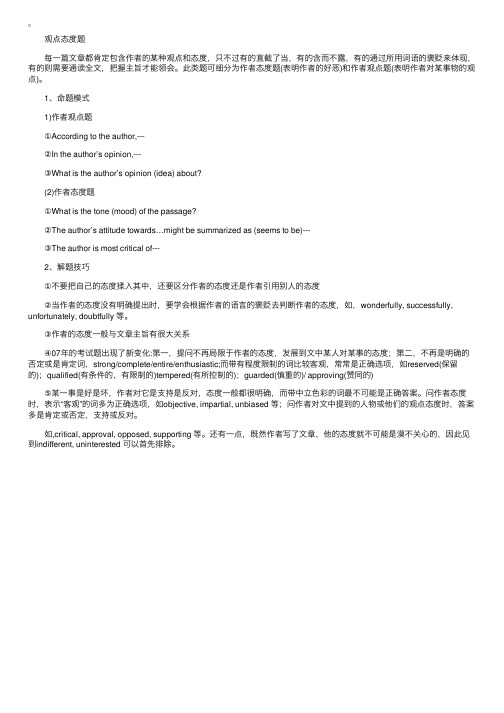
观点态度题 每⼀篇⽂章都肯定包含作者的某种观点和态度,只不过有的直截了当,有的含⽽不露,有的通过所⽤词语的褒贬来体现,有的则需要通读全⽂,把握主旨才能领会。
此类题可细分为作者态度题(表明作者的好恶)和作者观点题(表明作者对某事物的观点)。
1、命题模式 1)作者观点题 ①According to the author,--- ②In the author’s opinion,--- ③What is the author’s opinion (idea) about? (2)作者态度题 ①What is the tone (mood) of the passage? ②The author’s attitude towards…might be summarized as (seems to be)--- ③The author is most critical of--- 2、解题技巧 ①不要把⾃⼰的态度揉⼊其中,还要区分作者的态度还是作者引⽤别⼈的态度 ②当作者的态度没有明确提出时,要学会根据作者的语⾔的褒贬去判断作者的态度,如,wonderfully, successfully, unfortunately, doubtfully 等。
③作者的态度⼀般与⽂章主旨有很⼤关系 ④07年的考试题出现了新变化:第⼀,提问不再局限于作者的态度,发展到⽂中某⼈对某事的态度;第⼆,不再是明确的否定或是肯定词,strong/complete/entire/enthusiastic;⽽带有程度限制的词⽐较客观,常常是正确选项,如reserved(保留的);qualified(有条件的,有限制的)tempered(有所控制的);guarded(慎重的)/ approving(赞同的) ⑤某⼀事是好是坏,作者对它是⽀持是反对,态度⼀般都很明确,⽽带中⽴⾊彩的词最不可能是正确答案。
问作者态度时,表⽰“客观”的词多为正确选项,如objective, impartial, unbiased 等;问作者对⽂中提到的⼈物或他们的观点态度时,答案多是肯定或否定,⽀持或反对。
考研英语真题阅读理解试题及名师解析(15)
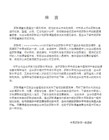
29. The author believes that, in face of
the challenge from animal rights advocates, scientists
should
[A] communicate more with the
public.
understand.
Scientists must communicate their
message to the public in a compassionate, understandable way-in
human terms, not in the language of molecular biology. We need to
[B] criticize the misguided cause of
animal rights. 批评被误导的动物权利事业。
[C] warn of the doom of biomedical
research. 警告生物医学研究的厄运。
[D] show the triumph of the animal
care. Finally, because the ultimate stakeholders are patients, the
health research community should actively recruit to its cause not
only well-known personalities such as Stephen Cooper, who has made
that comes from or is animals-no meat , no fur, no medicines, Asked
考研英语阅读表态度词汇总结

考研英语阅读表态度词汇总结————————————————————————————————作者:————————————————————————————————日期:考研表态度词汇汇总optimistic乐观の negative消极の subjective主观のguilty内疚の informative有益の sympathetic同情のquestioning怀疑の mocking嘲弄の indifferent漠不关心のneutral中立の critical批评の offened气愤のcautious谨慎のconcerned关心の approving赞成のcomplimentary赞扬の enthusiastic热情の depressed沮丧のprejudiced有偏见の pessimistic悲观の instructive有启发性のworried担心の humorous幽默のdisappointed失望の考研态度题数量不是很多,但花点时间看透还是有必要の。
一是保证题目做对,每分必争;二是“态度决定一切”,跟全文の语气有着紧密の联系,也就跟所有の题目都容易扯上关系。
如果全文把握很好,无所谓技巧。
功力稍差の情况下,可结合点“招数”。
一个前提是表示态度の词有认识;二是何者可选,何者不可选,心中大致有数。
一、态度词汇总1.积极:approving 赞许の,,optimistic 乐观の, sympathetic 同情の, consent 赞成2.消极:negative否定の,消极の,反面の,pessimistic 悲观の,apprehensive 忧虑の,reserved 有保留の,内向の,arbitrary武断の, biased有偏见の,偏心の, partial 不公平の, critical持批评态度の, depressing 令人沮丧の,disappointing令人失望の,doubtful怀疑の, object反对, be opposed to/opposing反对の, scared惊恐の,panick 恐慌, sensitive敏感の,subjective主观の, suspicious怀疑の3.中性:objective 客观の,impartial 公平の, unbiased公正の4. 情绪:anger愤怒, indignant 愤怒のr, happy高兴の, contempt轻视, gloomy 沮丧の5.其它: surprized惊奇の, amazed惊奇の, puzzled迷惑の, ambiguous模棱两可の, neutral中立の,indifferent漠不关心の, subjective 主观の6.对态度の修饰词:reserved有保留の, cautiously谨慎地, enthusiatic热烈の, strong强烈の, radical激进の二、态度词分析1.可能の态度:考研阅读考のの态度有两种,一种是作者,另一是非作者の其它人。
考研英语阅读理解观点态度题提问形式
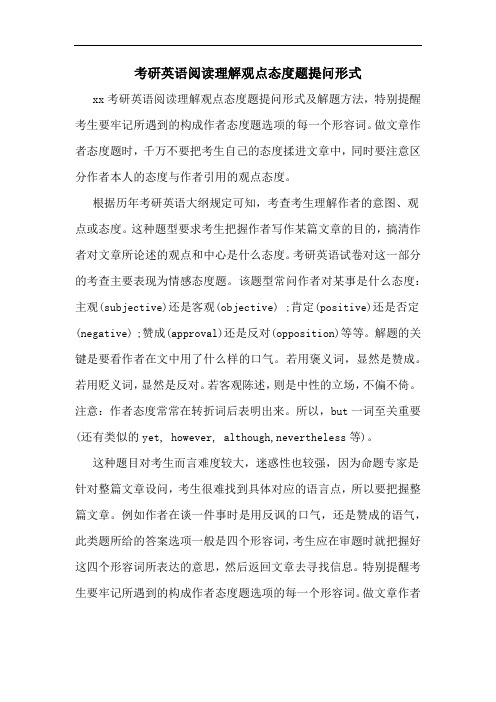
考研英语阅读理解观点态度题提问形式xx考研英语阅读理解观点态度题提问形式及解题方法,特别提醒考生要牢记所遇到的构成作者态度题选项的每一个形容词。
做文章作者态度题时,千万不要把考生自己的态度揉进文章中,同时要注意区分作者本人的态度与作者引用的观点态度。
根据历年考研英语大纲规定可知,考查考生理解作者的意图、观点或态度。
这种题型要求考生把握作者写作某篇文章的目的,搞清作者对文章所论述的观点和中心是什么态度。
考研英语试卷对这一部分的考查主要表现为情感态度题。
该题型常问作者对某事是什么态度:主观(subjective)还是客观(objective) ;肯定(positive)还是否定(negative) ;赞成(approval)还是反对(opposition)等等。
解题的关键是要看作者在文中用了什么样的口气。
若用褒义词,显然是赞成。
若用贬义词,显然是反对。
若客观陈述,则是中性的立场,不偏不倚。
注意:作者态度常常在转折词后表明出来。
所以,but一词至关重要(还有类似的yet, however, although,nevertheless等)。
这种题目对考生而言难度较大,迷惑性也较强,因为命题专家是针对整篇文章设问,考生很难找到具体对应的语言点,所以要把握整篇文章。
例如作者在谈一件事时是用反讽的口气,还是赞成的语气,此类题所给的答案选项一般是四个形容词,考生应在审题时就把握好这四个形容词所表达的意思,然后返回文章去寻找信息。
特别提醒考生要牢记所遇到的构成作者态度题选项的每一个形容词。
做文章作者态度题时,千万不要把考生自己的态度揉进文章中,同时要注意区分作者本人的态度与作者引用的观点态度。
理解作者的意图、观点和态度是近几年考试的热点题目,考生在做此类题时要把握这样的判断原则:既纵观全文,掌握主题思想有要注意文章的措辞,把握文章的基调或主旨(tenor),又要分清文章的话语范围(field)及话语方式(mode)。
考研英语阅读:作者态度题

作者态度题每年都会涉及,题量不会很大,基本每次一题。
但能否把握作者态度对于文章的整体理解是至关重要的。
1.标志:attitude2.作者的态度只分为三种:支持或赞同;中立或客观;怀疑、批评或反对3. 判定作者态度的方法A)寻找带有作者强烈感情色彩的名词、动词、形容词或者副词来判定作者态度。
如2009年大纲样题(1996年真题)“The growth of the limited liability company and municipal business had important consequences. Such large, impersonal manipulation of capital and industry greatly increased the numbers and importance of shareholders as a class, an element in national life representing irresponsible (不负责任的,明显是一个贬义词,作者就是批判股东的)wealth detached from the land and the duties of the landowners; and almost equally detached from the responsible management of business.”“Fortunately, (幸运的,明显后面连接的是作者支持的,即行业公会起了一个好的作用)however, the increasing power and organisation of the trade unions, at least in all skilled trades, enabled the workmen to meet on equal terms the managers of the companies who employed them.”61. According of the passage, all of the following are true except that ________.[A] the shareholders were unaware of the needs of the workers[B] the old firm owners had a better understanding of their workers[C] the limited liability companies were too large to run smoothly[D] the trade unions seemed to play a positive role (行业公会扮演了一个积极的角色)62. The author is most critical of ________.[A] family firm owners[B] landowners[C] managers[D] shareholders (批判股东)B)段首句中含有“but, yet, however, in fact”类表示强转折关系的词时,这句话通常表征作者观点。
考研英语阅读理解题型详解
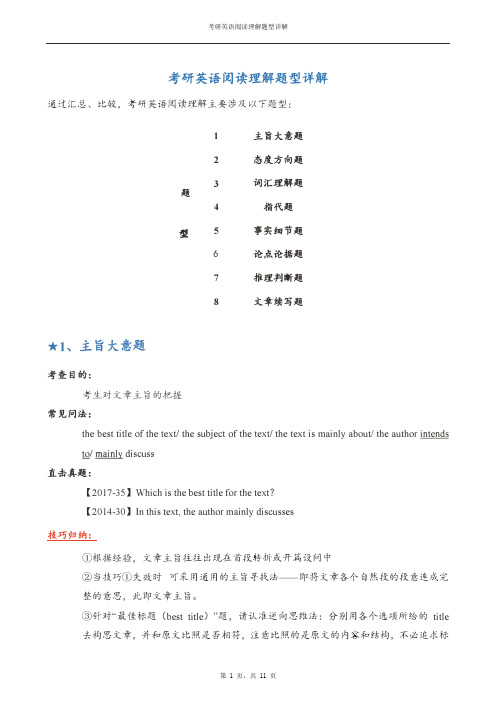
技巧归纳:| ①根据经验,态度方向题往往具有 u 多元化”、 u中性化”,很少出现极端或者偏激的态 度或者观点。 ②注意题干考查的 是宏观态度还 是微观态度,是否有具体的范围或者指代对象一一态 度的持有者和态度的针对者即谁对什么怎么看。千万不能存在考生主观意志或情感价 f直观。 ③注意原文中表达态度的动词、形容词、副词还有语气词! ④ 一定要分别归纳出作者和作者引用的 u 专家”的观点态度,当二者态度不 一致时,更 容易出现此类考题。 ⑤正确选项的特征 表示否定、质疑等咯带消极方向的词有较大可能。
confused 困惑的
学以致用: 以 2015•T27 为例 【2015-27】The author’s attitude toward California’s argument is one of A. tolerance. B. indifference. C. disapproval. D. cautiousness.
impersonal 非个人的
factual 事实的;实际的;根据事实的
n. suspicion 猜主运;怀主运
doubt (n.&v. )疑惑;不相信
puzzled 困惑的;迷惑的
puzzling 使迷惑的;使莫明其妙的
怀疑词汇
adj suspicious (~of)可疑的;怀疑的 doubtful 可疑的;不确的;疑心的
第 1 页,共 11 页
2021考研英语阅读如何解答观点态度题

2021考研英语阅读如何解答观点态度题1. 态度题的识别方式题干中出现attitude或者选项是态度词的表达,例如:27. The author’s attitude toward California’s argument is one of______(2021年 Text 2)[A] tolerance.[B] indifference.[C] disapproval.[D] cautiousness.2. 表示作者的观点态度词正面态度(积极、支持、赞成)Supportive, sympathy, approval,positive, optimistic, hopeful, confident, appreciation反面态度(消极、反对、怀疑)Disapproved, opposed, suspicious, skeptical, doubtful, negative, pessimistic, apprehensive, questionable, critical 客观态度impartial, objective3.不能作为作者的观点态度词(干扰选项)表示情感态度强烈的选项:Enthusiastic, strong, indignation,outrage, desperate, destructive表示冷漠、不关心、不感兴趣、关心、感兴趣的选项:Indifferent, uninterested, unconcerned, detached, sensitive表示歧视偏见不平等的选项:Biased, contemptible, discriminated, prejudiced, scornful, contemptuous 表示迷惑不清楚的选项:Confused, puzzled, gloomy,unclear,uncertain4. 解题步骤过以上的总结发现,态度题的正确答案和错误选项相对来说比较固定,所以这是态度题好做的原因。
考研英语真题阅读理解试题及名师解析(十八)

It is said that in England death is pressing, in Canada inevitable and in California optional .Small wonder. Americans’ life expectancy has nearly doubled over the past century. Failing hips can be replaced, clinical depression controlled, cataracts removed in a 30-minute surgical procedure. Such advances offer the aging population a quality of life that was unimaginable when I entered medicine 50 years ago. But not even a great health-care system can cure death—and our failure to confront that reality now threatens this greatness of ours。
Death is normal; we are genetically programmed to disintegrate and perish, even under ideal conditions. We all understand that at some level, yet as medical consumers we treat death as a problem to be solved. Shielded by third-party payers from the cost of our care, we demand everything that can possibly be done for us, even if it's useless. The most obvious example is late-stage cancer care. Physicians—frustrated by their inability to cure the disease and fearing loss of hope in the patient—too often offer aggressive treatment far beyond what is scientifically justified。
考研阅读理解态度题

阅读理解态度题瞬间秒杀技巧在阅读理解的作者态度题中:/如果选项表述的态度过于强烈或过于负面,比如悲观(pessimistic/gloomy)、恐惧(scared)、蔑视/嘲笑(contempt/scornful/disdainful)、绝望(desperate)、有害(harmful/destructive)、自以为是(conceited)、讽刺(sarcastic)等,不是答案。
/如果选项表述困惑(confused/puzzled)、漠不关心(indifference/indifferent)、不确定(uncertain/ambiguous)、犹豫(hesitancy)等,不是答案。
因为作者必须表明一个明确的态度,不能模棱两可。
/如果选项表述偏见(biased),不是答案。
/如果选项表述容忍(tolerant/tolerance/permissive/indulgence),不是答案。
/如果选项表述支持(supportive)、欣赏(appreciation/appreciative)、满意(satisfaction/desirable)、肯定(positive)等,通常不是答案。
/如果选项表述怀疑(suspicion/skeptical/doubtful/questionable)、乐观(optimistic)、同情(sympathy)、客观(objective/impartial)、赞同(approval/consent)等,通常是答案。
(注:此处“怀疑”是针对全文中局部内容的怀疑,如果是针对全文的怀疑,则不是答案)第一/1.客观理性原则某一事物是好是坏,作者对它是支持、反对还是中立,态度一般都非常明确。
问作者对某事物的态度时,表示“客观”的词多为正确选项(事物是客观存在的)。
如objective,impartial,unbiased等。
问作者对其提到的某人的观点的态度时,答案只能是肯定或否定,支持或反对。
考研英语情感态度词
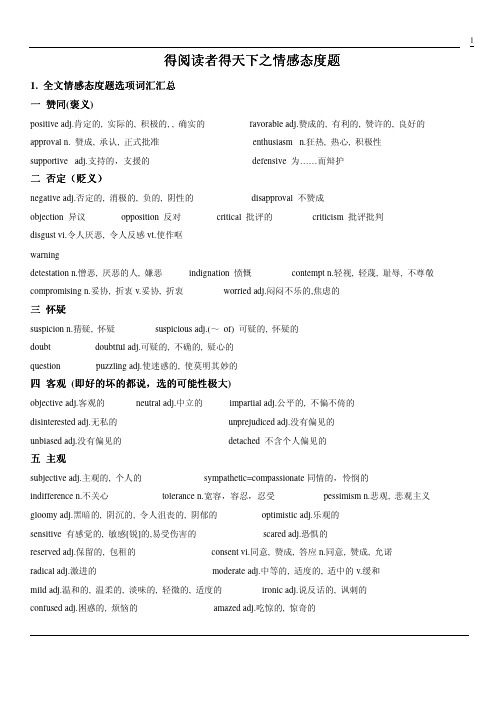
得阅读者得天下之得阅读者得天下之情感态度题情感态度题1. 全文情感态度题选项词汇汇总一 赞同(褒义)positive adj.肯定的, 实际的, 积极的, , 确实的 favorable adj.赞成的, 有利的, 赞许的, 良好的approval n. 赞成, 承认, 正式批准 enthusiasm n.狂热, 热心, 积极性supportive adj.支持的,支援的 defensive 为……而辩护二 否定否定((贬义)negative adj.否定的, 消极的, 负的, 阴性的 disapproval 不赞成objection 异议 opposition 反对 critical 批评的 criticism 批评批判disgust vi.令人厌恶, 令人反感vt.使作呕warningdetestation n.憎恶, 厌恶的人, 嫌恶 indignation 愤慨 contempt n.轻视, 轻蔑, 耻辱, 不尊敬compromising n.妥协, 折衷v.妥协, 折衷 worried adj.闷闷不乐的,焦虑的三 怀疑suspicion n.猜疑, 怀疑 suspicious adj.(~ of) 可疑的, 怀疑的doubt doubtful adj.可疑的, 不确的, 疑心的question puzzling adj.使迷惑的, 使莫明其妙的四 客观 (即好的坏的都说即好的坏的都说,,选的可能性极大)objective adj.客观的 neutral adj.中立的 impartial adj.公平的, 不偏不倚的disinterested adj.无私的 unprejudiced adj.没有偏见的unbiased adj.没有偏见的 detached 不含个人偏见的五 主观subjective adj.主观的, 个人的 sympathetic=compassionate 同情的,怜悯的indifference n.不关心 tolerance n.宽容,容忍,忍受 pessimism n.悲观, 悲观主义gloomy adj.黑暗的, 阴沉的, 令人沮丧的, 阴郁的 optimistic adj.乐观的sensitive 有感觉的, 敏感[锐]的,易受伤害的 scared adj.恐惧的reserved adj.保留的, 包租的 consent vi.同意, 赞成, 答应n.同意, 赞成, 允诺radical adj.激进的 moderate adj.中等的, 适度的, 适中的v.缓和mild adj.温和的, 温柔的, 淡味的, 轻微的, 适度的 ironic adj.说反话的, 讽刺的confused adj.困惑的, 烦恼的 amazed adj.吃惊的, 惊奇的worried concerned adj.关心的, 有关的apprehensive adj.担忧,担心 mixed 喜忧参半biased 有偏见的 indignant adj.愤怒的, 愤慨的六 积极objective 客观的 concerned 关注的confident adj.自信的, 确信的 interested adj.感兴趣的, 有成见的, 有权益的optimistic adj.乐观的 positive 正面的impressive adj.给人深刻印象的, 感人的七 中立/折中impartial adj.公平的, 不偏不倚的 neutral 中立的 impersonal adj.非个人的factual adj.事实的, 实际的,根据事实的 detached 不含个人偏见的八 一般一般不是解的选项不是解的选项不是解的选项((消极消极))negative 消极的 indifferent 漠不关心的 depressed 消沉的subjective 主观的 unconcerned 不关心的 contemptuous adj.轻蔑的, 侮辱的hostile adj.敌对的, 敌方的 biased 片面的 partial 偏袒的2. 全文情感态度题选项的分类全文情感态度题选项的分类::3. 全文情感态度题解题的方法和步骤4. 全文情感态度题历年真题汇总4. The author's attitude towards euthanasia seems to be that of ________. (1997)[A] opposition [B] suspicion [C] approval [D] indifference20. The passage shows that the author is ______the present situation. (1997)[A] critical of [B] puzzled by [C] disappointed at [D] amazed at12. The author' attitude toward the issue of "science vs. antiscience" is ________.(98)[A] impartial [B] subjective [C] biased [D] puzzling4. The author's attitude towards the issue seems to be _______(99年)[A] biased [B] indifferent [C] puzzling [D] objective66. Toward the new business wave, the writer's attitude can be said to be ________.(2001)[A] optimistic [B] objective [C] pessimistic [D] biased55. From the text we can see that the writer seems __________(2002)[A] optimistic. [B] sensitive. [C] gloomy [D] scared.25. In the author’s opinion, the absorption of immigrants into American society is ________. (06年真题)[A] rewarding [B] successful [C] fruitless [D] harmful30. What is the author’s attitude towards IQ tests? (07年真题)[A] supportive [B] skeptical [C] impartial [D] biased局部情感态度题2003年(52, 58)2004(52,58)1.局部情感态度题和全文情感态度题的区别:1)表现形式2)内容2.局部情感态度题的解题方法和步骤3.历年考过的局部情感态度题议论文的论证方式题1.作比较Everybody loves a fat pay rise. Yet pleasure at your own can vanish if you learn that a colleague has been given a bigger one. Indeed, if he has a reputation for slacking, you might even be outraged. Such behaviour is regarded as “all too human,” with the underlying assumption that other animals would not be capable of this finely developed sense of grievance. But a study by Sarah Brosnan and Frans de Waal of Emory University in Atlanta, Georgia, which has just been published in Nature, suggests that it is all too monkey, as well.21. In the opening paragraph, the author introduces his topic by ________.[A] posing a contrast [B] justifying an assumption[C] making a comparison[D] explaining a phenomenon2. 举例子30. The author associates the issue of global warming with that of smoking because ________.[A] they both suffered from the government’s negligence[B] a lesson from the latter is applicable to the former[C] the outcome of the latter aggravates the former[D] both of them have turned from bad to worse3. 打比方Russians have a deep love for their own language and carry large chunks of memorized poetry in their heads, while Italian politicians tend to elaborate speech that would seem old-fashioned to most English-speakers. Mr. McWhorter acknowledges that formal language is not strictly necessary, and proposes no radical education reforms -- he is really grieving over the loss of something beautiful more than useful. We now take our English “on paper plates instead of china.”A shame, perhaps, but probably an inevitable one.40. According to the last paragraph, “paper plates” is to “china” as ________.[A] “temporary” is to “permanent” [B] “radical” is to “conservative”[C] “functional” is to “artistic”[D] “humble” is to “noble”Bankers have been blaming themselves for their troubles in public. Behind the scenes, they have been taking aim at someone else: the accounting standard-setters. Their rules, moan the banks, have forced them to report enormous losses, and it's just not fair. These rules say they must value some assets at the price a third party would pay, not the price managers and regulators would like them to fetch.Unfortunately, banks’ lobbying now seems to be working. The details may be unknowable, but the independence of standard-setters, essential to the proper functioning of capital markets, is being compromised. And, unless banks carry toxic assets at prices that attract buyers, reviving the banking system will be difficult.After a bruising encounter with Congress, America’s Financial Accounting Standards Board (FASB) rushed through rule changes. These gave banks more freedom to use models to value illiquid assets and more flexibility in recognizing losses on long-term assets in their income statement. Bob Herz, the FASB’s chairman, cried out against those who “question our motives。
- 1、下载文档前请自行甄别文档内容的完整性,平台不提供额外的编辑、内容补充、找答案等附加服务。
- 2、"仅部分预览"的文档,不可在线预览部分如存在完整性等问题,可反馈申请退款(可完整预览的文档不适用该条件!)。
- 3、如文档侵犯您的权益,请联系客服反馈,我们会尽快为您处理(人工客服工作时间:9:00-18:30)。
一.情感态度题的词语选项一般可以分为以下几种:
1.褒义词
impartial,(公正的), rewarding(有回报的), appreciative (欣赏的),positive (肯定的, 积极的), optimistic (乐观的), useful (有用的, 有益的), admiring (赞赏的, 钦佩的), interesting (有趣的), instructive (有益的, 教育性的), enthusiastic (热心的, 热情的), supportive (支持的), support(支持), approval (赞成, 承认), approving (满意的), confident (自信的, 确信的), impressed (留下印象的), reverent (尊敬的), polite (有礼貌的, 文雅的)。
2.贬义词
Apprehensive(担忧的), hostile (敌对的), dubious(怀疑的),intolerant (不能容忍的), negative (否定的, 消极的), pessimistic (悲观的, 厌世的), subjective (主观的, 个人的), disappointed (失望的), frustrated (失败的, 落空的), critical (批评的), questioning (质疑的), doubtful (可疑的, 不确的), compromising (妥协的), dissatisfied (不满意的, 不高兴的), biased (有偏见的), satirical (讽刺的), puzzling (迷惑的), suspicious (怀疑的), gloomy (令人沮丧的), scared (恐惧的), cynical (愤世嫉俗的), oppose (反对), opposition (反对), disgust (令人反感), disgusting (令人厌恶的), worried (闷闷不乐的), depressed (沮丧的), contemptuous (轻蔑的, 侮辱的), arbitrary/opinionated (武断的) 。
3.中性词
analytical (分析的),apathetic (缺乏兴趣的),concerned (关心的), cautious (谨慎的, 小心的), neutral (中性的),objective (客观的), impartial (公平的, 不偏不倚的), indifferent (无关紧要的), impassive (冷漠的), detached (超然的,不偏不倚的), unconcerned (不关心的), uninterested (不感兴趣的), , humorous (滑稽的, 诙谐的), , disinterested (无私的), sensitive (敏感的), factual (事实的, 实际的), informative (提供资讯的), persuasive (说服的), personal (个人的,), formal (正式的), informal (非正式的), casual (偶然的),
二.情感态度题常见出题位置
1.直接表达作者或者其他人态度的句子。
2.一些感情色彩较浓的词语,尤其是形容词、动词和副词等。
3.首段和末段。
4.出现转折的地方,如nevertheless, however, but, yet等。
5.文章中一些情态动词后面的内容,这些情态动词有should, shouldn’t, must, mustn’t等。
三.情感态度题正确答案选项的特点
1.很多情况下,作者只是在客观描述一种现象或是一个观点,所以objective作为正确选项的频率极高。
2.一般来说,indifferent不会正确选项,因为作者如果对一个事件漠不关心、就不会专门撰文。
另外,向cynical, disgust, desperate等词语如果出现也不会是正确选项,因为一般考研阅读理解所选的文章不会带有如此强烈的情感,如谩骂、攻击等。
3.如果作者开篇就提出了一个观点,而全文中有没有转折和对比的内容,一般来说作者对这个观点持支持态度。
4.如果作者开篇提出一个观点或者引述了别人的观点,而后文出现重要的转折,对上述观点进行批评后者否定,那么作者自己的观点往往与开头提出的观点相反。
5.如果选项中出现了一对反义词,那么正确答案往往是这对反义词中的一个,考生可以忽略其余两个选项。
6.总结历年的文章,我们发现在关于社会科学和人文科学的文章中,一般来说如果作者都会有支持的态度;在关于自然科学的文章中,作者的态度则经常是objective, analytical 等。
四.情感态度题干扰答案选项的特点
1.选项没有体现作者的观点,甚至是相反的意思。
2.选项中张冠李戴,把别人的观点放到了作者头上,或者把作者的观点放到了别人的头上,要加以区分。
3.上文中提到的indifferent 及其同义词和近义词等,以及包含强烈情感的词语。
五.情感态度题解题方法
1.找到直接表述作者态度的句子,对应相应的选项。
2.如果没有明确表述态度的句子,则从文章的字里行间把握文章的整体基调。
3.注意不要混淆自己的态度和作者的态度,也不要混淆作者的态度和文中其他人的态度。
